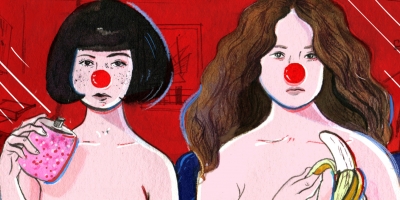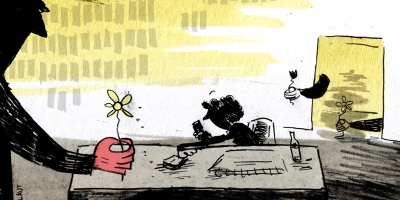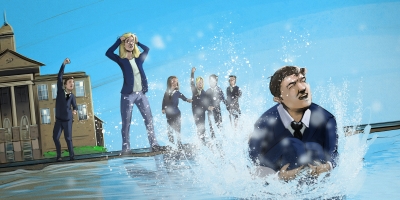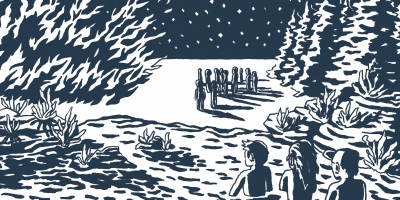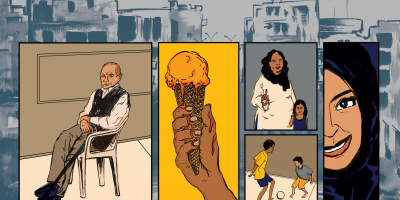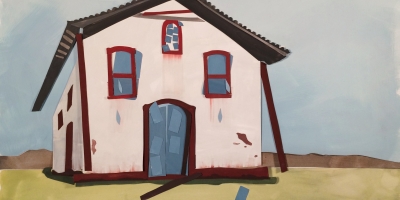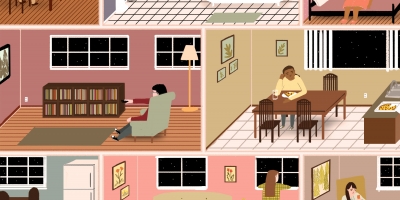Nonfiction
Agemus
by Nandini Balial

Names of all involved have been changed to protect the nerdy, the innocent, the troublemakers, and the educators.
In the unkempt, frenetic bank of your middle-school memories, what stands out? The physical agony of puberty? Sweat drenching your armpits and collar during PE? Incipient popularity amongst your classmates (or the opposite)? Playing in the school band or a band of your own?
I remember that my bones ached when I tried to sleep at night—my mother said I was growing, but my verticals remained static. I didn’t have blond hair or a voice decent enough for choir. Another six years would pass before the invention of clinical-strength deodorant, so I wore two T-shirts at all times. My frizzed curls complied with neither my mother’s comb nor classic Texas humidity, so every day, before leaving the house, I slicked my hair down with Vaseline. My skills were purely academic, so each morning’s departure felt like going to my true home.
In one of the worst neighborhoods in the city of Fort Worth is William James College Readiness Academy, a middle school, public, large. I attended it for grades six through eight, 2001–2004. Gang activity swirls for miles in each direction (if I recall correctly, the Crips and Bloods were the primary dueling forces at the time), and a multistory police station sits, grim and watchful, right across the street. The school is accustomed to the following: fights between students at any point before, after, or during the day; graffiti, especially gang signs, etched into desks, their brazen larger siblings slashed in black paint on the school’s exterior; bomb threats. Occasionally the men and women from the building across the street step in with pepper spray. When I was there, the pregnancy rate was so high that all female students were regularly hauled into the auditorium and admonished to “be where you’re supposed to be.”
At the time, 70 percent of William James students came from the homes in the blocks surrounding the school. They were mostly black and Hispanic, and they were known somewhat pejoratively as “regular kids.” The remaining 30 percent was a mix of white, Asian, black, and Hispanic students who were in the school’s magnet program, which required you to apply for entry.
At this same school was a crop of the most intelligent students the Fort Worth Independent School District has ever seen. I was lucky enough to be a member. Our good fortune, however, lay not only in our burgeoning talent, but also in the dedication of our teachers. Specifically, our Latin teacher, Mrs. Sabine Hayskar. That is not her real name; although retired, she still, as far as I know, resides in Texas, and has a son and several grandchildren. She hails from Finland, so I’ve chosen for her a Finnish praenomen (Latin for “colloquial first name”) and cognomen (Latin for “family name”).
As sixth graders, we took a semester of Latin. The next year, we earned the official designation of Latin IA, both semesters. Our textbook, titled Lingua Latina, was maroon with a mural depicting the Via Appia on the front. I was frightened to translate that first body of text; I think we all were.
This was what lay before us:
“Rōma in Italiā est. Italia in Eurōpā est. Graecia in Eurōpā est. Italia et Graecia in Eurōpā sunt. Hispānia quoque in Eurōpā est. Hispānia et Italia et Graecia in Eurōpā sunt. Aegyptus in Eurōpā nōn est, Aegyptus in Āfricā est. Gallia nōn in Āfricā est, Gallia est in Eurōpā. Syria nōn est in Eurōpā, sed in Asiā. Arabia quoque in Asiā est. Syria et Arabia in Asiā sunt. Germāniā nōn in Asiā, sed in Eurōpā est. Britannia quoque in Eurōpā est. Germāniā et Britannia sunt in Eurōpā.”
But we got to work. The lesson was simple, and we caught on quickly.
“Rome is in Italy. Italy is in Europe. Greece is in Europe. Italy and Greece are both in Europe. Spain is also in Europe. Spain and Italy and Greece are all in Europe. Egypt is not in Europe, Egypt is in Africa. Gaul is not in Africa, Gaul is in Europe. Syria is not in Europe, but is in Asia. Arabia is also in Asia. Syria and Arabia are in Asia. Germany is not in Asia, but is in Europe. Britain is also in Europe. Germany and Britain are in Europe.”
Thus began our grade-school journey with Latin.
At this point, I should describe Mrs. Hayskar. When I first met her, she’d been teaching for at least twenty-five years. She was the only Latin teacher at William James, so we spent more time with her over the years than with any other magistra (“teacher”), gym coaches notwithstanding. She spoke nine languages, none of them fluently (by her own admission), including English. Her shoulder-length blond hair was somehow both crimped and lank, and her wire-rimmed glasses and usual uniform of slacks and blouse seemed normal enough. But Mrs. Hayskar was not normal. She was a genius, an eccentric, and a legend in her own right at William James, itself an old school, first built during the Great Depression.
What made her stand out was her demanding nature. Her grading system was severe; I was a good student, but even I struggled to cement an A at report-card time. If she called on you in class and you gave an incorrect answer, Mrs. Hayskar, instead of posing the question to the rest of the class, would exclaim, “Oh, for Pete’s sake!” and wait until you found the right answer. A teddy bear named Furry Burry, bedecked in a black and fluorescent-green vest, sat in the tray where we submitted homework. It was impossible to avoid his gaze at any point during class, and Mrs. Hayskar would sometimes cradle him, possibly to convey how she valued Furry Burry’s good behavior over our antics. Her peculiar accent rapidly became a subject for mockery—the only inflection we, most likely incorrectly, recognized, was Germanic.
The students who took Latin were primarily magnet kids, ranging from the standard-issue middle-class (me) to the rich (whose parents were lawyers, petroleum engineers, doctors). We’d all applied to switch from the schools in our home zip codes to William James, proud provider of more honors courses and a disproportionate amount of misdemeanors and minor criminal activity.
I knew no one when I started middle school. The loneliness worsened when I, without regard for my social standing, asserted my extremely studious nature. I sorted my binders and dividers, labeled them in my neat cursive, checked off assignments in our school-issued planner as I completed them, received straight A’s. This didn’t win me any friends, but classmates were more considerate once it became clear that I was good at Latin and forthcoming with answers to our homework.
My grasp of Latin was not unique, though. Of note were the following classmates: Tom, the pudgy-faced math whiz, forever pushing his round glasses up his nose, attracted the wrong kind of attention for roving around school with a rolling suitcase as a backpack. Soft-spoken Ellie had needle-like straight hair and was known for her handwriting, which was on par with a typewriter’s output. She and I would, years later, serve as co–editors in chief of our high-school newspaper. Eric straddled several worlds: he was extremely intelligent with good grades, a pretty good basketball player, and the guy who started the trend of saying “graphing calculator” when you meant “penis.”
The rabble-rousers who studied Latin were smart, too. Their penchant for classroom devilry, pranks, and driving Mrs. Hayskar up the wall, however, outpaced their capacity for noun declensions and pop-quiz success. Rogues’ gallery superstar: Jeff, thick black hair occasionally spiked with product, a boisterous laugh, record timing for hurling insults at friends.
Jeff’s skills at undermining Mrs. Hayskar’s authority by talking while she spoke were freakishly effective. She’d stop speaking, as would he.
“Who is talking!” she’d say. This was never a question, just a loud point of order, always met by silence.
“Was it you, Jeff?”
“No, Mrs. Hayskar, I’m sitting here taking notes.”
Her irritation only caused us to giggle. Jeff’s partners in crime included Frank, a freckled soccer player who came up with insults and jokes every couple minutes. They always sat in the back of Mrs. Hayskar’s classroom with Andy, a genial guy with watery blue eyes and feathery blond hair. His spectrum of mischief (spitballs, paper planes, talking back to a teacher, fart machines) brought his grim-faced doctor father to school on the regular. A small mousy boy named Chris was probably more intelligent than all of them combined, but consistently threw a wrench into classroom proceedings with his foul mouth and intentional distractions before a quiz or test. Peter was their ringleader: dimples, regular infractions and suspensions, played bass in the school orchestra. Once, after being written up for detention and sent to the principal’s office, he came up with a marvelous solution which I secretly applauded: he tore up and flushed the teacher’s note in the boys’ restroom, waited for passing period, and simply went to his next class, bright blue L.L.Bean backpack slumped off one shoulder.
Full disclosure: Jeff and Frank became good friends of mine in high school; the latter attended NYU with me.
It may seem like I’ve vilified Mrs. Hayskar, and she was in many ways the most intimidating force in our lives. But she was also one of the best teachers I ever had. Besides verb conjugations and passage translations, Mrs. Hayskar drilled us in noun declensions, derivatives, and mythology. (We learned imperative forms of verbs by playing a Latin version of Simon Says.) And without our specific consent, she roped us into competing in the Junior Classical League of Texas.
JCL is a national organization that promotes the study of classical languages in public schools, grades six through twelve. Teachers and schools apply for membership; schools in districts can form chapters; states host conventions each year. The contests included reading comprehension, Greek & Roman mythology, derivatives, Latin literature, mottoes, vocabulary, dramatic interpretation (more on that later), sight reading, abbreviations and quotations, and the Decathlon (a contest that combined all the above). Local competitions were held in Plano, Flower Mound, Grapevine: wealthier north Texas suburbs, usually in and/or around Dallas. State competitions were held in the suburbs of larger cities, like Houston and San Antonio.
During my first few weeks at NYU, I mentioned JCL competitions to a new acquaintance.
“What’s that?” she asked.
I was surprised. “It’s a series of Latin competitions,” I explained. “You go to them at the local and state level and compete in grammar, reading comprehension, the Pentathlon.”
She shook her head. “I’ve never heard of that. It sounds super nerdy.”
It damn well was nerdy.
To this day, I have no idea if participation was optional, but all fifty of us who studied Latin at any given moment at William James competed. Everyone in Latin IA and IB (seventh graders) and Latin IIA and IIB (eighth graders) took part. Mrs. Hayskar had our parents sign consent forms, issued lists of what to bring, wrote room assignments, booked motel rooms, and used god knows what kind of reward to coerce parents into chaperone service.
So we’d set off for a city forty minutes to several hours away by car, overnight bags in hand, eager to embark on an overnight field trip that took us away from William James for three-quarters of Thursday and all of Friday. The troublemakers plotted in the back of the bus, laughing raucously at Beavis and Butt-Head videos on the staticky TVs. Toward the front, I shook in my seat, alone, palms damp, steeling myself for a competition more terrifying than any math test. Mrs. Hayskar had noticed my Latin pronunciation; fluency in Hindi and Bengali meant I was comfortable with diphthongs and vowels uncommon in English. She signed me up for dramatic interpretation. That’s the JCL contest where a participant studies an assigned piece of Latin literature or poetry—adjusting delivery for tone, speakers, subject matter—and recites it to a judge from memory.
I have a decent memory. That wasn’t a problem. It was Mrs. Hayskar’s preparation method that petrified me. I’d memorize at home, and at the beginning of class each day, for three weeks before a competition, she had me stand in front of her desk, face my classmates, and recite the passage to them.
I wanted to sink into the chewing-gum-dotted carpet and never resurface.
Disrupting my horrible daily ritual would’ve only gotten the boys further reproach from Mrs. Hayskar, so no one said much. If I paused, said “um,” or in any way ruined the flow of my speech, Mrs. Hayskar rapped a wooden ruler on her desk and had me start over. At JCL itself, I landed in the top three every time.
More importantly, I can still recite the passages I had to memorize—a true testament to my teacher’s methods.
I competed in mythology, too. Edith Hamilton flew through my hands, then Thomas Bulfinch, then both, again and again, as did the more juvenile mythology volumes in the school library. Frustrated, I picked up Robert Graves at the public library and set out to devour his works instead. My other JCL forte was derivatives, a foregone conclusion for someone who loves words. Latin provided this gift to my classmates and me, whether or not we gave it the same consideration: We were studying the language that created word parts. It allowed us to trace the linguistic heritage of the SAT and ACT vocabulary that were first shot at us like missiles in seventh-grade English. For a language nerd like me, Latin was catnip.
My classmates did extremely well at JCL, too. Ellie reigned supreme in reading comprehension, and Emily, a broad-shouldered girl who grew up to become a Tea Party supporter, mastered the Decathlon. Tom was a fiend at sight reading. I do not remember what the troublemakers competed in, but I’m sure it was something. No one ever went on a JCL trip without something to do.
But JCL had two components, one factual, the other incidental. Academic contests were held during the day, but we had a certain amount of time at the motel, in our rooms, upon arrival, and each night.
We were bright kids, destined to set academic records in high school with scholarship offers and SAT scores.
What do you imagine we did with all this free time?
Well. On one trip, after we arrived at a motel, Mrs. Hayskar told us that under no circumstances was anyone to go near the swimming pool. Our parental consent forms did not mention pool access, and at any rate, we weren’t allowed in without a chaperone’s supervision.
Not ten minutes after that speech, Andy, fully clothed, cannonballed into the pool.
What was Mrs. Hayskar to do? Ask his parents to come fetch him? Somehow ban him from competing but leave him at the motel each day? No, she did the only thing she could do, which was to ring Andy’s father on the phone, and ask him to explain to his dad what he’d done. Andy’s response was always the same: he grinned like the goof he was, holding Mrs. Hayskar’s cell phone a good foot from his ear.
On a different trip, Frank, Andy, Jeff, and Tom were rooming together. One of those things was not like the others: Tom most likely made himself scarce while the first three tried to find things to do. And boy, did they ever. Jeff had the ingenious/ludicrous idea to spray their room’s mirror with Axe body spray. Someone had sneaked a lighter in with the backpacks, and the boys lit the sprayed mirror on fire.
I don’t know much about Axe body spray, or the minds of adolescent boys, but I do know that if you light the former on fire during a school trip, everyone in the motel rooms near you will smell it. Everyone not near you, including your classmates who don’t study Latin, will hear about it. It’s amazing the fire alarm didn’t go off. And that Tom’s dad, who was that room’s chaperone, knew nothing about it.
This men’s-fragrance pyromania was a hit. One of the wealthier boys had ordered pizza to the motel, charging the rest of us a dollar a slice if we dropped by their room. I went, pled penury; they took pity on a nerd and let me have a slice for free. It was thrilling to sit with troublemakers, to feel accepted. That was the first time I saw an episode of South Park. I left soon thereafter to, naturally, study.
The boys had leftover pizza, going cold. They sprayed it with Axe, and—wait for it—lit it on fire.
Unconfirmed is the story that one of the boys—Jeff—lit his Axe-sprayed pubic hair on fire. I assume this lasted mere seconds, once he recognized his life was about to become 1000 percent more painful. I never thought to ask him, but I like thinking this is true.
Prank calls were another joy of JCL trips. For anyone uninterested in vandalism, this was the simplest form of tomfoolery in a motel. You could call anyone! You just needed the room number! The ease of the task amplified our excitement. We dropped our bags off near the dining table or AC unit and alighted before the phone. First we rang up each other’s rooms, and when I think of this now I don’t understand what was so unbearably funny about hearing your classmates’ voices on a telephone during a field trip. There was plenty of screaming, cursing, cheering. Every now and then, we screwed up and called an adult—a chaperone, or on one occasion, Mrs. Hayskar herself.
She began marching up and down the corridors to interrogate us.
“The motel can tell me if you made a phone call!” she yelled. This was probably true, but we paid it no mind.
If it seems as though I’m lionizing the behavior of my classmates, please understand that for me, hearing about/seeing these antics was the extent of my own rule-breaking. Only in observation could I partake. In nightmares alone did I talk back to a teacher. If I forgot a homework assignment, I wept, and I’d never thrown nor even made a paper plane, much less set anything on fire. Order pizza to a motel and pay for it with money I didn’t have—how was that done? Was it all right to call Domino’s and ask for a pizza if you weren’t an adult? What punishment awaited you, at home and at William James, if you jumped in a pool when told not to?
There was one instance, however, when I dipped my toe into disobedience. I think we were in eighth grade, four of us to a room, including Emily the future Tea Party fan; Teresa, a skinny girl with a wide toothy smile; and Roberta, my oldest friend in this country, who harbored a bottomless resentment for Latin and often felt punished by Mrs. Hayskar calling on her in class, railing at her for the right answer.
From our window we could see the pool, which, again, we weren’t authorized to use. Sitting in the pool’s Jacuzzi were a half-dozen high-school-age boys. Shirtless, sunglasses, tanned, muscled, smiling and hollering. The four of us decided to wave, smile, just to convey our delight and appreciation. They noticed and started grinning, waving, gesturing for us to join them. We preened in this moderate hormonal success: how grownup, how very mature of us, to attract the attention of men—not those boys traipsing about with body spray and lighters. We took turns at the window, smiling our prettiest, blowing kisses. The evening was more fun than we could’ve ever imagined.
Until the phone rang. And it wasn’t a chaperone, or Mrs. Hayskar. It was one of the boys from the pool.
Apparently, figuring out room numbers isn’t difficult. We were on the second floor; the boys counted up and over, dialed 209, and found us. For a few breathless moments, Emily spoke to them, introduced herself, described us to them. We could hear all six laugh and cheer. Then Emily slammed the phone down.
It rang again. Roberta picked up. She was less forthcoming with information, and it was now evident that the boys really, really wanted to meet us. How old were we, how tall were we, and so on. She slammed the phone down as well. It didn’t stop ringing. We didn’t answer.
Shortly thereafter, we tried to laugh off the incident and go to bed: competitions began at 8:30 AM sharp. We’d just turned off the lights when we heard a knock on the door.
No one moved.
The knocking continued, and one or more of the boys might’ve shouted something like, “Come meet us, we think you girls are hot!”
Still no one moved. The boys shuffled away.
Not long after that, Teresa asked if any of us had ever heard of axe murderers. Emily and Roberta shuddered, but I said, “No, I haven’t, what is that?”
I feel guilty that I asked for a description, because I didn’t need the imagery, nor did any of the other girls. The entire night we lay awake, staring at the door, wondering if our foolishness would end in bros wielding an axe first through the door, then through our bodies. We never waved to strangers on field trips again.
The Friday of each JCL weekend ended in a dance. At home, I wasn’t permitted to attend the likely awkward dances held in the smelly gym, but this was something special. Competitions were held at massive high schools in order to accommodate the influx of participants, and the cafeteria would be cleared for the dance, lights lowered, a DJ present. You didn’t have to go, but aside from the thrill of competing, the Friday night dance was my favorite JCL event.
This surprised everyone, who knew me only as the smart bespectacled Indian girl with a difficult name and steadfast devotion to good grades. What surprised them even more was my dancing. My brain pushes all else aside when I dance. At JCL, I let loose in a way that caught my classmates completely off-guard. Their eyes popped as they turned to one another: “Goddamn, Nandini can dance!” Yes. I could, and I can. Good grades have limited charm: they’re a relief, and perhaps your teachers are proud of you, but they earn the disdain of your peers. Anyone can make straight A’s. Not everyone stepped onto the dance floor at JCL with consummate abandon.
Of course, the end of JCL meant a return to the mundane: home, rules, less interesting classes, math homework and math quizzes and math tests. I don’t know about anyone else, and I never asked, but when my mind wandered away from the algebra lesson on the overhead projector, or when I felt stifled and sad at home, or when I tried to hide from any given day’s PE humiliation, I flipped the pages in my planner, past all the homework deadlines and test dates, past piano lessons and doodles, and looked at the unmarked columns of the next JCL’s dates, the clean promise of the future—the next win, the next dance, the next trip out of Fort Worth and into a realm where I felt certain of my own success.
2004. Spring, likely March. I was thirteen, most of my classmates fourteen. We’d changed quite a bit. As eighth graders, we felt like we had the run of the place, applying to and touring competitive public high schools, slowly accumulating college brochures. It’s a very special sort of stress, being that age and peering with inward reluctance (but outward nonchalance) at the abyss that is high school.
But I couldn’t think about all that. We were at state JCL. It was somewhere near San Antonio. The contests were over, as was the talent show that began the final program of results. Someone sang Christina Aguilera’s “Beautiful.” A handful of boys from St. Mark’s in Dallas performed a sketch that was inaudible but indelibly awkward. I may or may not have played a sonata by Schubert on the piano. Applause for the above should be imagined in descending order.
State JCL was exceptionally competitive. St. Mark’s was home to very dedicated Latin students, which made them our natural enemies. We’d competed in nearly everything, including the troublemakers. My brother took part for the first time, as a seventh grader, along with Frank’s sister Catherine; their mother, an endlessly cheerful librarian, was by that point a regular chaperone.
Results took ages. Every single competition had to be announced, and ten winners in each were handed ribbons. Each team’s wins were tallied for a final score, which is how schools were evaluated against one another. We squirmed on the aluminum bleachers for so long that the flat metallic taste crept onto my tongue.
Our attention was erratic. If we won a given contest, everyone cheered and clapped, and we ran down to collect our ribbons and shake hands with the judges. Ribbons were considered extra credit and therefore extremely valuable, so we turned them into Mrs. Hayskar as soon as we reached our seats. But as soon as the judges started announcing the results of a contest we didn’t have a stake in, we chatted and laughed. The boys ran sideways and up and down the bleachers till Mrs. Hayskar screamed, “Stop! Stop it!” Even the judges would ask the gym for silence every few minutes, but we were teenagers. If we hadn’t participated, we didn’t care at all.
Mrs. Hayskar was tracking our scores, though, and we were doing well.
“Shhh! I mean it now!” she commanded us, as if she somehow hadn’t meant it before. But this time we listened, because the final round of awards was next.
About forty of us competed that year, if memory serves. The bus was large, upholstered in blue cushions, with thin diagonal stripes of white and beige stitched into corners. We probably stopped at Jack in the Box or Wendy’s or McDonald’s on the way there and back. Dinner was provided by the host school: almost always pizza, or limp warm spaghetti with Texas toast.
In other words, it was just a variation of all the JCL trips that came before, with two exceptions: First, we forgot about daylight saving time, so Sunday morning we woke, dressed, and got ready for the day’s contests at 4 AM.
And second, we won first place at state.
William James hadn’t taken home first place in over a decade. We altered that record. It was neither the first nor the last time my classmates and I set benchmarks for academia in Fort Worth.
As I write about that frenzied moment—surprise, then total joy, then a thunderous stampede down the bleachers to the stage, where we hoisted the trophy into the air; Mrs. Hayskar, despite all the grief we gave her, beaming with pride—I think about my former classmates who might read this essay. She remembers that? I imagine them wondering, shaking their heads at my waxing rhapsodic about JCL. Most of us studied Latin in high school, but not with any enthusiasm. Three months into ninth grade, we realized Mrs. Hayskar had taught us enough for several years’ worth of future study, and junior year AP Latin IV was no fun whatsoever without everyone else. Only one person from our group became a classics major in college.
To my surprise, however, I’ve found a small community of Latin aficionados on Twitter. Professors and grad students, certainly, but enthusiasts, too, from various fields: lawyers, poets, bankers, actors, editors. It never occurred to me that a dead language could have an afterlife, especially on social media. I can discuss Catullus, make jokes about the fucked-up nature of Greek and Roman myths, and, best of all, describe JCL to people who understand my love for it.
Perhaps my peers from William James do not understand. Their ribbons are likely now fading in a box in their parents’ basement. Plenty of them are married, have children. I doubt they’re smiling at the memory of a roomful of thirteen-year-olds chanting, upon Mrs. Hayskar’s command,
“Sum, es, est! Sumus, estis, sunt! I am, you are, he/she/it is! We are, you are, they are!”
Or conjugating the verb facio (“to make”) with glee because it sounded like “fuck you,” which you couldn’t otherwise say at school. (Well. You could, but you couldn’t get caught.)
Or conjugating the verb ago (various definitions, including “to do”), because its first person plural, agemus, is pronounced exactly like “a gay moose.” The entire room would chortle at this, and even Mrs. Hayskar would smile slightly.
Then she’d yell,
“Okay, okay, cut it! Cut the noise!”
